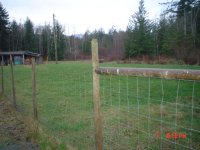cptbfp
New member
We are going to be getting a few alpacas and I will be building a run-in shed and a small fenced area. I have never put up fencing before and have a few questions for the experts.
We will be using 2"X4"X60" fence and plan on fencing a rectangular area 50 feet by 100 feet. I am unsure what kind of corner posts would be appropriate for this size area. The best corner posts seem to be 8" diameter pressure-treated wooden posts with H-bracing but I'm wondering if this is overkill for a fenceline that will be so short? I have seen corners constructed with t-posts and braced using t-posts and Wedge-Loc connectors. This approach is attractive because I wouldn't need to dig post-holes (no post-hole digger for my tractor and not excited about doing it by hand) and it would be significantly cheaper than using wooden posts. The question is, would the t-post corner system be strong enough to hold without sagging? Alpacas don't challenge fencing and don't climb on it so they shouldn't contribute to stress on the posts. I don't want to go cheap and easy and regret it in the near future but also don't want to over-build the fence if I don't need to.
So, given these options, what would the experts do??
Thanks,
Brian
We will be using 2"X4"X60" fence and plan on fencing a rectangular area 50 feet by 100 feet. I am unsure what kind of corner posts would be appropriate for this size area. The best corner posts seem to be 8" diameter pressure-treated wooden posts with H-bracing but I'm wondering if this is overkill for a fenceline that will be so short? I have seen corners constructed with t-posts and braced using t-posts and Wedge-Loc connectors. This approach is attractive because I wouldn't need to dig post-holes (no post-hole digger for my tractor and not excited about doing it by hand) and it would be significantly cheaper than using wooden posts. The question is, would the t-post corner system be strong enough to hold without sagging? Alpacas don't challenge fencing and don't climb on it so they shouldn't contribute to stress on the posts. I don't want to go cheap and easy and regret it in the near future but also don't want to over-build the fence if I don't need to.
So, given these options, what would the experts do??
Thanks,
Brian

